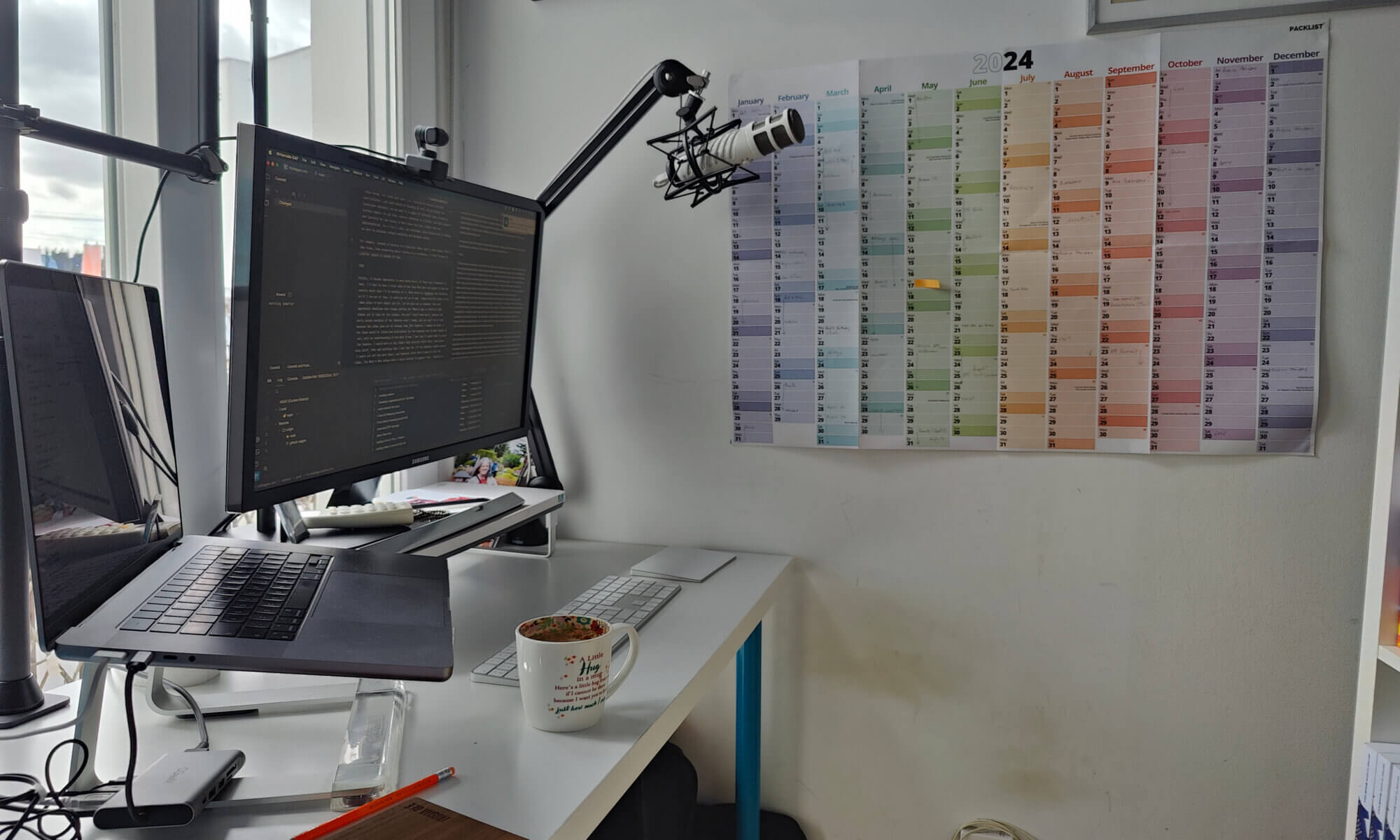I wrote a 3000 word blog post in response to a Tweet about how having kids changed my career (which in retrospect probably doesn't even answer the question). So I decided to pull this section out into its own post. It became a 2000 word blog post about planning, sigh. This is why I find it hard to find time to blog.
So here are my Top Tips For Time Management And Planning for Working Parents.
Calendars. Allllll the calendars
I have three computer/cloud-based calendars1 (well, more really but three that I maintain) - work; personal; and joint with my husband. The personal has stuff I don't need to clutter our shared stuff with, although it's often rammed with duplicate things - my Calendly account is off Personal so I have to copy key stuff into it if I want Calendly to actually be correct2. Joint has, well joint stuff, but also things like blocks of time where I have work meetings, so my husband knows that he can't schedule anything that needs me during those times. We have to put the kids' rubbish in there too, like their after-school stuff. The third is work, which is the simplest I guess, but I also make sure I have school pick-up and drop-off blocked in there so people don't schedule meetings at the times where I'm responsible for those. On my work calendar, I also block out time for workouts if my exercise time overlaps with work hours (my husband and I alternate workout/school drop off in the mornings so when I do drop-off I still need some time to work out).
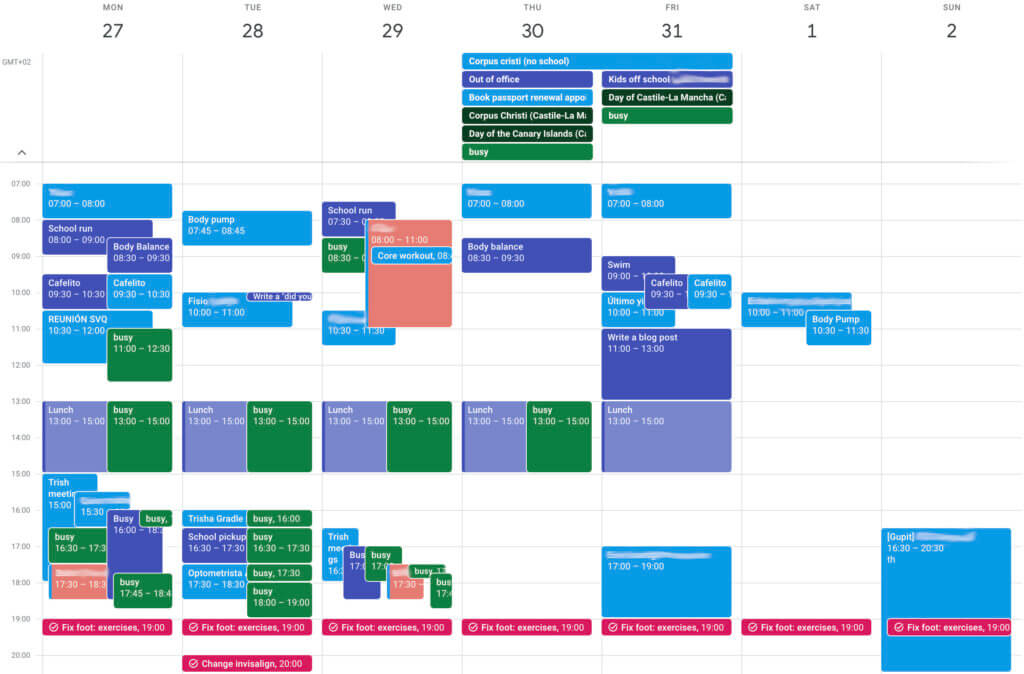
I am a creature of routine, so having a pre-determined set of dates and times for me to be in charge of kids' stuff and for my workouts and for being in contact with work folks is nice for me. And it also prevents surprises and reduces cognitive load - most of your life as a parent is trying to flex what needs to be done with what people want to do, so having clear and transparent assigned times, blocked out, means you have to think less.
Because I travel for conferences and because I make time to travel to the UK to see friends and family, and they travel here to see me, all of those things also need to be in the shared calendar. I also tend to put these in my work calendar too so I can make better decisions about whether I'm able to do particular things during a week. If it's a personal item I make sure it's set to private so people can't see the details, and if it means I won't be able to attend meetings (like if I'm at a conference) I make sure it's marked as "busy" so people can't book me at that time.
An extension of this is, if you really want to make sure something gets done, it must be on the calendar. I put a recurring event a few months ago on both my personal and work calendars to do blog writing on Friday mornings. This is the first time I've actually managed, but it reminds me that it's something I want to invest my time in, and it (mostly) prevents people, including myself, from scheduling meetings or other activities, on a Friday morning. And yes, I also schedule time to have coffee with my husband. Because life gets in the way.
Also, if:
- I'm at crunch time
- I'm forced to work on a few things at the same time which do require a context switch
- I have to work on something and I don't have a clear idea of whether the deadline seems reasonable or my estimate is correct
then I block out (in my personal calendar) time for specific tasks. E.g. mornings might be working on specific videos, afternoons might be split between meetings, admin time for chasing emails, thinking time for some other content, or research for something. When I see it all in the calendar, I can a) get a good feel for how much time I really have to finish something and b) force myself to focus on the highest priority thing. These time blocks have to be realistic. They have to include kids' stuff like pickup and drop off, working out, travel time, lunches, and other set activities. Advocacy can be a weird mix of maker's schedule and manager's schedule. Here at Gradle, I'm much more involved in communicating between different departments, so I have several meetings every week, but at JetBrains, I kept meetings to a minimum because of the amount of content I had to produce - it would have been impossible to have that output and have regular meetings too.
To balance the maker/manager schedule, I generally use mornings for content and "makers" stuff, and afternoons for meetings (because US timezones) and "managers" stuff. It's not perfect for me, because I have discovered I feel more creative and productive after lunch, but you have to work with what you've got. I also generally have Thursdays and Fridays free of scheduled stuff (apart from kids' stuff of course) which means I can usually rely on getting a bunch of stuff done on Thursdays and can use Friday for whatever I didn't get to (hence I often don't actually blog).
Old school wall calendar
However, I have found that computer calendars are not great for me, personally, to manage things like travel and events at the big-picture level. You look at a week and see you have availability, and say "yes" to something without seeing the context of travel or vacation or family stuff the week or weekend before or after.
For this, I use a big annual wall calendar. I've only been doing this for two years (compared to the 8+ years I've been having to manage all this stuff) and it works really nicely. If I'm on a call with someone and they ask if some deadline is going to work, I just have to glance right to see if there's anything big already around that time. If I'm planning a conference, or if a friend wants to come and visit, I can see if I have anything exhausting around about the same time. I have fewer conference clashes and fewer "Oh my God what have I committed to" moments these days.
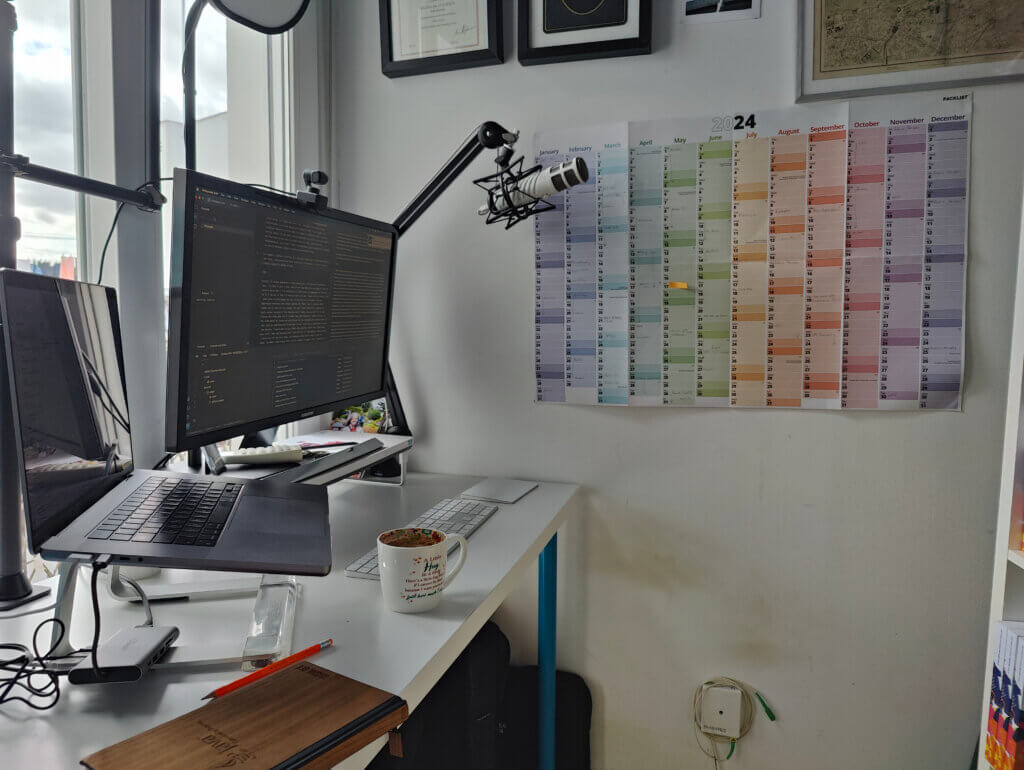
This wall calendar contains:
- Travel to conferences and events, visits to the UK
- School holidays and major dates for kids' stuff
- Everyone's birthdays, anniversaries, etc
- Dates when friends and family are visiting here
- Major deadlines (for work or home)
- Important dates for things like online presentations or demos, where I know I'll need some time to prep and/or I can't organise any travel at that same time
Tracking and prioritisation
When I was at JetBrains, I was a YouTrack power user, tracking all the various activities I was involved in. Videos, blog posts and articles, Twitter tips, new presentation creation, conferences & events, podcasts, interviews, coding, and then management stuff like reviews and collaboration, all needed to be planned and balanced. These things all take different amounts of effort and time and usually have different types of deadlines - a What's New video has a very strict set of parameters for when you can work on it, between the EAP feature becoming available and the actual release. A conference has a deadline for a CFP, and there's usually a month or so where you can apply, and then the immovable deadline of the conference itself. Also, conferences tend to crash horribly into other immovable deadlines like releases, and I got really good at figuring out how many I could commit to in autumn (when the major clash was) and how to make sure those conferences only required travel time and no extra prep (I usually only committed to give talks that had already been given earlier in the year). I learnt there's always next year, and you don't have to commit to every conference every year. I generally alternated years for JavaOne and Devoxx Belgium, for example.
I tracked everything with a YouTrack card, putting any deadlines on it and including estimations. Yes, estimations, I know - but I spent a bunch of time tracking how long it took to do things like blogs and videos, and working with timeboxes, so I got confident working with estimates of 1 day, several days, a week or a couple of weeks, that was the granularity, basically t-shirt sizes. I created sprints for the calendar month (it was the easiest way for me to visualise what needed doing) and I would commit to about half of the amount of time available. For a month's worth of time, I needed to commit to about 2 weeks worth of work. That was the realistic velocity. Less, if holidays were scheduled.
At Gradle, we use Trello. I miss my very structured YouTrack boards, but the reality is I'm not juggling anywhere near as many high priority things with deadlines and I don't work on as much varied content (so far I've been working on one HUGE piece with others which can be tracked with a spreadsheet). I'm still tempted to move to YT but Trello is doing fine right now, and working in a Kanban rather than sprint-based fashion suits the requirements for the Gradle work better as we have fewer firm deadlines.
I use OneNote as a general catch-all tracker for work, home, shopping, writing, and YouTube video ideas. It's basically unsorted (although I do have notebooks and sections, let's be honest here), but it is synced across all my devices and it's a good way to catch thoughts and ideas when I'm on the go, and come back to them later and, and this is important, put them in the right place. Like an issue tracker.
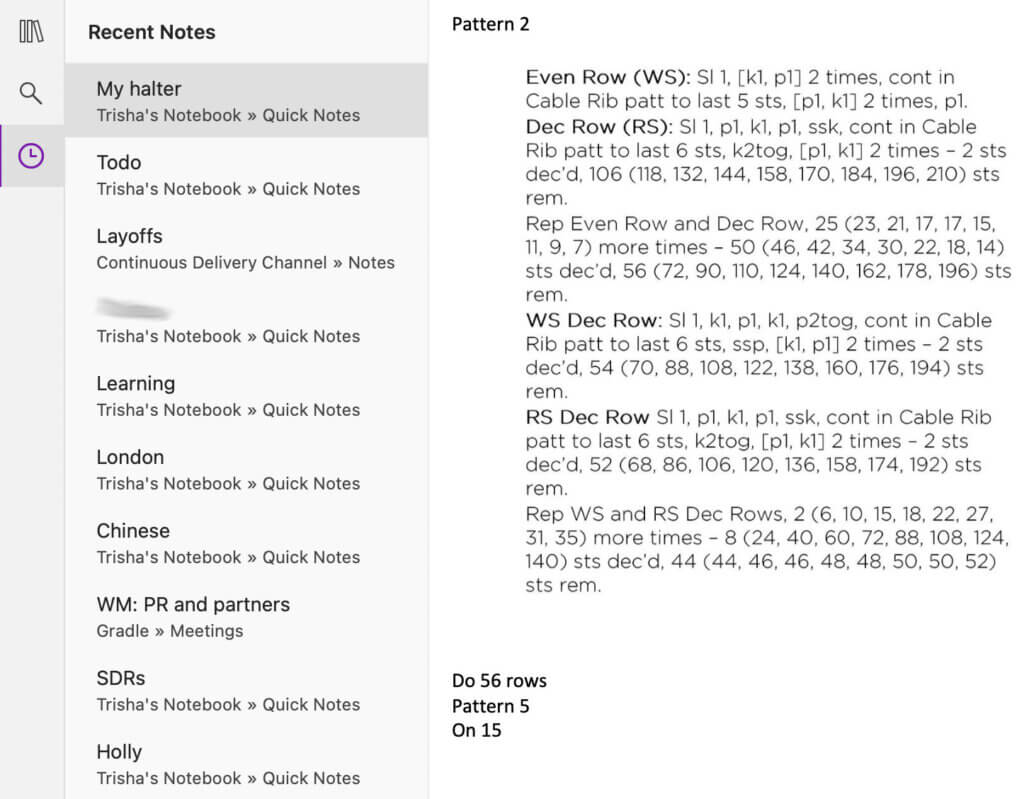
Weekly and daily TODOs
These days, I track what I want to achieve for the week in a physical book, including home stuff that needs to be considered, like doctors' appointments, physio, kids' theatre performances, appointments with kitchen and window specialists (we're also building a new house, don't ask), hair and nail appointments.
On a daily basis, I try to commit to the right amount to do in a day, I try not to over-commit and let things roll over. I'd prefer to do everything and if there's still time (there never is), pick a new item off the week's list, or even give myself a break. The day's activities will be pulled off the week's list and perhaps things that didn't get done yesterday, but will also include today's meetings and whatever exercise or activity I wanted to do today, as well as all the home stuff and kids' that needs doing (laundry makes a regular appearance, sigh, I break it into achievable chunks, like "wash and dry dark colours". Just "laundry" is an item that can never be ticked off).
Why do I do this? For two reasons: 1) some days as an adult, especially as a parent, are just full of crap like doctor's appointments, parent-teacher meetings, school shows and so on, and if you have meetings these also interfere with the time available. If you don't track these you risk over-committing to other stuff for today. I also must put my workouts on there so I can visually see it is just as important as all the work stuff that needs doing, and 2) you can cross more stuff off! As soon as you've worked out, cross it off, yay! One thing done. And on those adulty days where it feels like you've done nothing, when you look at your list and see orthodontist, physio, parent-teacher meeting, optomotrist, check feedback on video, all checked off, you feel much better about what you managed to achieve that day.
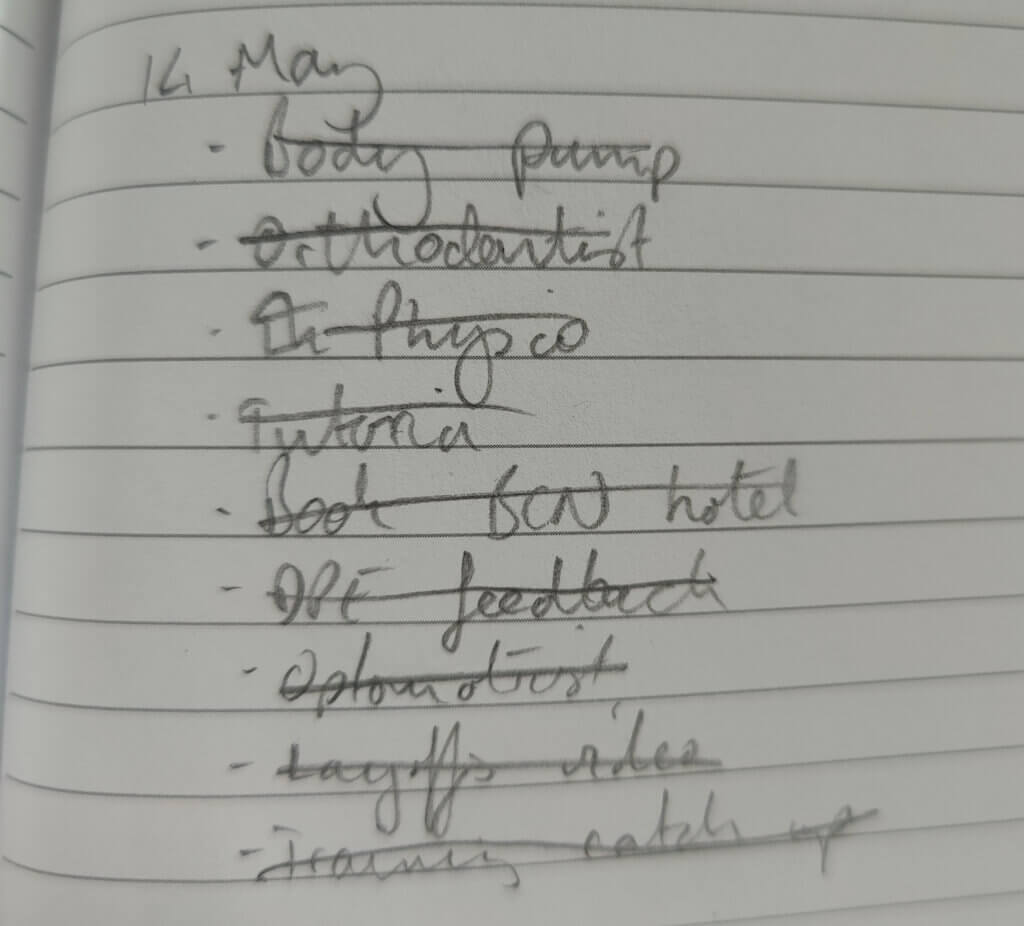
In Summary
I have always been a calendar and list sort of person, so these tips might not work so well for everyone. However, I have found that the tip of having a single list with all the crap in it together resonates well with a number of people.
Another potential downside - when I flew to Atlanta for Devnexus, I didn't bring my physical book, intentionally. But I'd forgotten I'd written "stuff you can do this week" in there. That should have been in OneNote so I could see it everywhere. The physical book and physical calendar only work when I'm at my desk, and assumes that key stuff is synced/duplicated with online notes and calendars.
Overall though, if you want to reduce your cognitive load as a parent, tracking, planning, prioritisation and shared calendars are good places to invest time.
1 Note that this section is all about calendars that you can sync across all your devices, particularly phone and laptop, and share with people like work colleagues and family members.
2 I find Calendly very helpful personally and professionally, as a developer advocate there are always people asking "when can we set up a meeting" and if they're outside of work this is a much easier way to answer that question than to go backwards and forwards via email.


